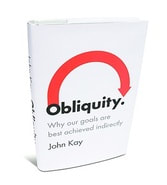 Being goal oriented is a popular virtue these days. There are innumerable websites promoting all sorts of methods to increase productivity, wealth, health, happiness, and so much more. The sometimes unstated, but more often over-stated, message of many of these resources is that we need to sit down, clearly define our goal, and march directly towards it. Our failure to achieve these goals is then attributed to our lack of focus, lack of drive, lack of persistence. But, what if our real failure is related to our attempt to achieve our goals directly? What if we shifted our focus away from our ultimate goals? Perhaps we would have better success in achieving them. This seemingly counter-intuitive idea is the subject of John Kay's very interesting book Obliquity. To see what he is getting at let's take a look at some examples of important goals best achieved indirectly.
Happiness: Everyone is striving to be happy. But, studies have shown that the happiest people are the ones who are the least focused on this goal. Those who are most happy with their own lives tend to be ones focused on helping others to be happy. Or they are focused on achieving some other goal whether it be performing a task well, completing a project, raising a child, creating a piece of art. By focusing on other things they end up being happy. They end up happier than they would have been had happiness been their direct goal. Wealth: I have a few students every semester who tell me that their goal is to be wealthy. But, they are often dumbfounded when I point out that most wealthy people do not focus on becoming wealthy. Instead, they focus on doing something well, running a company, making a product, serving other people. They pursue these goals with drive and passion. Often with an obsessive rigor. As a result, they end up wealthy. As Kay points out, the most profitable companies are not profit-driven. Social Order: One of the most intriguing passages in Adam Smith's The Wealth of Nations describes the possibility of arriving at social order by focusing on individual self-interest: "By pursuing his own interest he frequently promotes that of society more effectually than when he really intends to promote it." Leaders would do well to remember this insight as many of the problems created by leaders of companies and countries are the result of attempting to promote direct solutions to problems that would be better solved by indirect solutions. To understand these examples we have to be willing to recognize the limits of our own knowledge, the biases in our own thinking, and the possibility that these too can be overcome not directly but by being indirectly addressed. Direct solutions work well on straightforward problems where all the information needed is known. But, in a world where individual knowledge is often incomplete and imperfect, our best recourse is to oblique solutions. The ultimate example of obliquity is the example of the diversity of life that is all around us and how that diversity arose. In formulating the theory of evolution through natural selection, both Darwin and Wallace recognized the insight that this diversity was driven indirectly. Order could result from disorderly processes working with a healthy dose of randomness. This theory still confounds many today precisely because it is based on the insight that obliquity is a powerful force at work in the world. We need to embrace the insight and the uncertainty that comes with it. If you're concerned about your own happiness, your own wealth, your own success, your own love life, try focusing on something else. Try helping someone else. Try serving others in some useful way. And, without intending it you will achieve your goals. Indirectly with obliquity. Comments are closed.
|
KEVIN J. BROWNEPhilosopher / Educator These blog posts contain links to products on Amazon.com. As an Amazon Associate I earn from qualifying purchases.
Categories
All
Archives
April 2023
|



 RSS Feed
RSS Feed
















